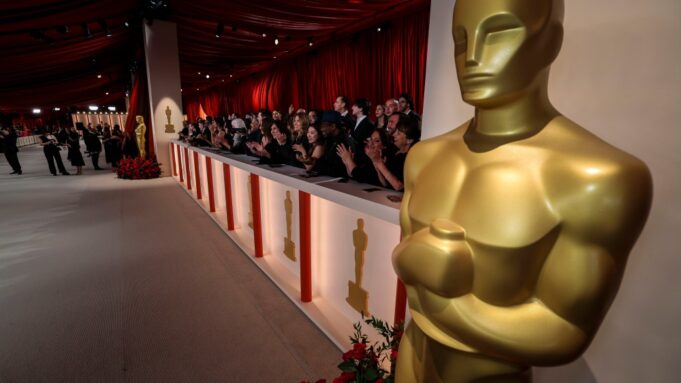Being an actor and talking about your work is challenging. Let me slip into my America Ferrara voice for this part…
You have to be confident, but not arrogant. You have to believe in yourself and your talent but appear humble and even shocked by the praise. You have to speak eloquently about your craft but be in awe that people value your opinion. You have to be charming, but not “thirsty.” You have to want it, but not “too much.”
As this Oscar season at long last comes to a close, we’re about to see if months of strategy and campaigning pay off for certain individuals. The work potential winners put into this race is never more evident than in the acting categories, as it tends to be the big-name stars who people turn out to see. They go on TV and talk about the challenges of their acclaimed roles. They hop from Q&A to Q&A where they are asked to talk about how they made a movie they shot months ago. They shake hands at parties and screenings and events and smile and pose for selfies. It is very much the business part of show business.
And who can fault them? If you had a chance to win an Academy Award, would you not dedicate a few months of your life to the chance? Yes, I know we technically shouldn’t care. We do it for the work and love of the game, but affirmation is really, really nice, too. Or let’s even look at it from a less jaded point of view: If you spent months — even years — of your life on a project that you poured your heart and soul into, you would want people to see it. You want to talk about it. You know you must go out there and sell it. Not only to people will watch it, but to help guarantee future work and opportunities. And maybe the little gold man at the end of it all is just the icing on the cake. Or it’s the cake itself – let’s work with that metaphor for now.
But every year there is at least one person who seems to become the target of vitriol for coming off too desperate, wanting the win too badly. (I would like to stress here that this is primarily an online sentiment bandied about by a small section of the population and I don’t think it actually resonates outside of Hollywood bubbles.) In 10 years, people might not remember the catty comments about Anne Hathaway and Melissa Leo. But they probably remember that they’re both Oscar winners.
To be honest, I’ve laughed at some of the memes and jokes this year — there are some really funny ones! But at some point, it starts to feel like bullying, and it makes me wonder what kind of a message we’re sending to artists about taking pride in their work. Much better writers have already discussed this phenomenon and talked about how ridiculous it is. And how the industry seems to resent this “theater kid” energy it exudes.
So I honestly want to know: What would people prefer to see? Do you want to see someone who isn’t working too hard? Because nobody wants to sit through a movie where it feels like the filmmaker or performer is doing a half-assed job. Trust me, I’ve suffered through plenty of those. The Oscars are designed to honor excellence, which I feel implies at least, you know, trying.
Of course, trying can come off as phony when actors start speaking thoughtfully or — God forbid — get emotional. Which is also unfair for us to judge. As an actor, you must have the ability to have easy access to your emotions — be ready to do a dramatic crying scene for the fifth time while a giant camera is in your face and a bunch of crew just want to break for lunch. So why do we then slap down these same people for admitting a role or a project is meaningful to them?
And it’s not just about high-profile stars on the campaign trail. Every day actors have to fight this battle I’ve spoken to many recently – ranging from Oscar nominees to people just starting out – and asked about the contradiction of promoting yourself or a project without being off-putting. (I won’t even get into how self-promotion is perceived differently for people from marginalized communities.) One actor, who works primarily in New York theater, summed it up thusly: “You cannot expect anyone to believe in you if you don’t let everyone know you believe in yourself. And that means being your own hype man.”
Another noted: “You have to be a bit delusional in your talent to pursue careers in an industry so stacked against us.”
Many noted the most successful actors they know are the ones who understand it’s not just about talent, but some degree of business savvy. So working the room, building the relationships, putting on the show is all part of it. We can’t then turn around and punish someone for doing it well. Put in simpler terms: Bradley Cooper isn’t going to see your snarky remarks on Twitter, but your friends who poured their heart into that song / movie / one-person and were brave enough to put it into the world are.
Of course, it is ultimately about finding the joy in the work, not the perks of it. Back to that icing metaphor. As one actor said, “Everything else is like a beautiful piece of cake. It’s temporary, it’s glittering, and it’s just as likely to delight you as make you sick.”
From Variety US































